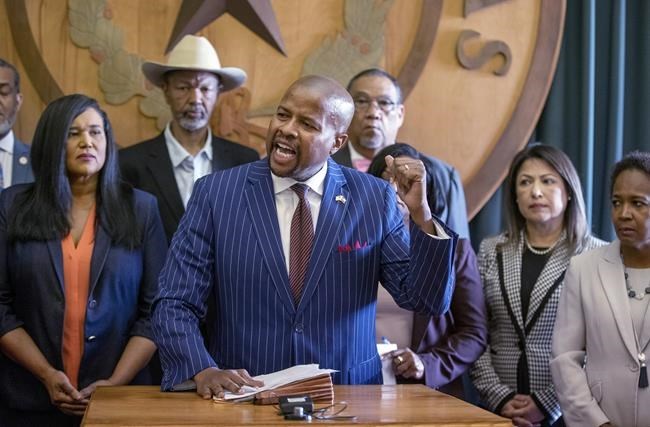AUSTIN, Texas (AP) — Democrats pulled off a dramatic, last-ditch walkout in the Texas House of Representatives on Sunday night to block one of the most restrictive voting laws in the U.S. from passing before a midnight deadline.
The sudden revolt torpedoed the sweeping measure known as Senate Bill 7, which would have reduced polling hours, empowered poll watchers and scaled back ways to vote in Texas, which is already has some of the nation's strictest voting laws.
For Democrats, the victory may be fleeting: Republican Gov. Greg Abbott, who had declared new voting laws in Texas a priority, quickly announced that he would order lawmakers back to the state Capitol for a special session. He did not, however, say when that would happen.
“We’ve said for so many years that we want more people to participate in our democracy. And it just seems that’s not the case,” Democratic state Rep. Carl Sherman said.
Less than 24 hours earlier, the bill seemed all but guaranteed to reach Abbott's desk. The Texas Senate had approved the measure in a vote before sunrise, after Republicans used a bare-knuckle procedural move to suspend the rules and take up the measure in the middle of the night during the Memorial Holiday weekend.
But as the night wore on in the House, the GOP's chances wobbled. About two hours before the midnight deadline, Democrats began filing out of the chamber in greater and greater numbers, denying Republicans the quorum necessary to hold a final vote. The walkout handed Republicans a rare defeat in the Texas Capitol where they control every lever of power and wield overwhelming majorities in both the House and Senate.
State Rep. Chris Turner, the Democratic House leader, said he sent a text message to members of his caucus at 10:35 p.m. telling them to leave the chamber.
“We killed that bill,” Turner said.
Republicans showed restraint in criticizing Democrats for the move.
“I am disappointed that some members decided to break quorum,” said Republican state Rep. Briscoe Cain, who carried the bill in the House. “We all know what that meant. I understand why they were dong it, but we all took an oath to Texans that we would be here to do our jobs.”
The move was reminiscent of 2003 when outnumbered Democrats twice broke quorum to stop Republican efforts to redraw voting maps. House Democrats first left the state en masse for Ardmore, Oklahoma only to return several days later. Senate Democrats delayed a special session that summer by going as a group to Albuquerque, New Mexico for several weeks.
Ultimately, neither effort worked as the Democrats eventually returned to the Capitol and Republicans passed the bill.
Under revisions during closed-door negotiations, Republicans added language that could make it easier for a judge to overturn an election and pushed back the start of Sunday voting, when many Black churchgoers head to the polls. The 67-page measure would also eliminate drive-thru voting and 24-hour polling centers, both of which Harris County, the state’s largest Democratic stronghold, introduced last year.
Texas is the last big battleground in the GOP’s nationwide efforts to tighten voting laws, driven by former President Donald Trump’s false claims that the 2020 election was stolen from him. Georgia and Florida have also passed new voting restrictions, and President Joe Biden on Saturday unfavorably compared Texas’ bill to election changes in those states as “an assault on democracy.”
The vote in the Texas Senate came just a short time after a final version of the bill had been made public Saturday. Around midnight, Republicans wielded their majority to suspend rules that would normally prohibit taking a vote on a bill that had not been posted for 24 hours, which Democrats protested as a breach of protocol that denied them and the public time to review the language first.
Paul J. Weber And Acacia Coronado, The Associated Press



